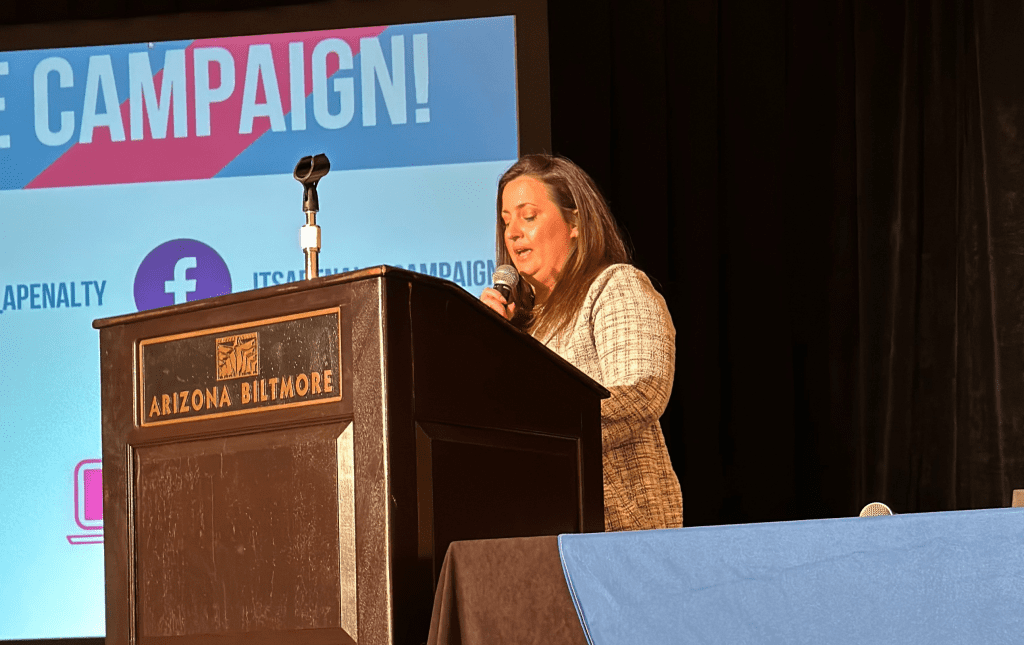The importance of championing survivors as experts by experience

After living through human trafficking and abuse, some people want to speak out, tell others about their experiences and use their expertise to create change. The experience can be healing and positive for some, and in speaking out they are able to combat the stigmatization of survivors, destroy harmful stereotypes and help others.
Survivors are experts by experience, which is why it is so critical to listen to, and include survivors in all human trafficking prevention efforts.
In January, It’s a Penalty launched its 15th campaign in Phoenix, Arizona ahead of the Super Bowl LVII. For this campaign, we partnered with a local NGO, Where Hope Lives. Where Hope Lives is home to the largest human trafficking rescue and recovery operation in North America, housing around 200 people per year. They are located at the Phoenix Dream Center (ages 18+), StreetLightUSA (ages 13-17), and Colorado City Dream Center (familial trafficking survivors).
What’s unique about the programme, is that survivors, regardless of gender, age or walk of life, are able to stay for as long as they need and until they feel fully equipped with the emotional and physical tools needed to reintegrate back into everyday life. We were fortunate enough to be invited to see their Phoenix Dream Center, and learn more about the work they do.
We pulled up to a large building on a sunny Saturday morning in Phoenix and were warmly welcomed by Carlos Daniel, Chief Development Officer and JoAnna Shipe, Corporate Initiatives Director at the Center. It was clear that the 30,000 sq. ft building, once a Comfort Inn Hotel, had undergone a transformation since the Dream Center was founded in 2002. The rooms did not replicate dreary and clinical spaces, each vibrant room and floor had been carefully tailored to individual needs. It appeared that no small detail had not been thought of. They had an on-site hospital, explaining that for many survivors, going to doctors can be a trauma trigger due to their trafficker often being present. The on-site hospital allows survivors to work through their trauma independently in a safe space. Each flat was equipped with new kitchens, TVs, and separate bedrooms. There were some rooms that had mood lighting and weighted blankets. For many survivors, their time at Where Hope Lives, would be the very first time they would experience having any independence, from what they ate, to what they wear, and even when they speak. It was clear that each room had been designed to foster self-confidence, healing, and the development of healthy independence. During our visit, we also had the pleasure of being introduced to their therapy dog, Odie, a large poodle mix with the biggest smile! He helped residents who did not feel as comfortable with people on their most difficult days.
As part of the partnership, we worked closely with their team, many of which consist of survivors who have previously already completed their programme. For our launch event, we were honoured to have Alisha speak to our partners and other experts in the hotel and tourism industry looking to improve their prevention efforts. She spoke candidly about her experience, leaving not a dry eye in the room:
“Every experience was a rock bottom for me. Thinking about what I just did, thinking about what I had to endure, wanting those late nights and early mornings to be over. Now in 2023, I am a survivor, I am a mother, and I have a voice and I’m here to stand up against human trafficking and exploitation.” – extract from Alisha’s speech.
We followed our launch by joining Hilton hotel staff training, we presented our campaign and invited Irene (pictured), a survivor and Men’s Programs Manager on the Human Trafficking Recovery Program, to speak. Irene shared her story and how she has used her experience to help young men who have been through similar abuse. Her testimony and expertise helped hotel staff, who are often on the frontlines of witnessing trafficking to understand the importance of recognising when someone may need help.
Touring the Phoenix Dream Center was a critical part of our Super Bowl LVII Campaign demonstrating the meaningful impact that local NGOs can have on the rehabilitation and healing of survivors. Moving forward, at It’s a Penalty, we plan on continuing to work with survivors and ensuring all of our campaign materials contain relevant and contextual information.
Written by Anisa Easterbrook
Communications and Marketing Director, It’s a Penalty
